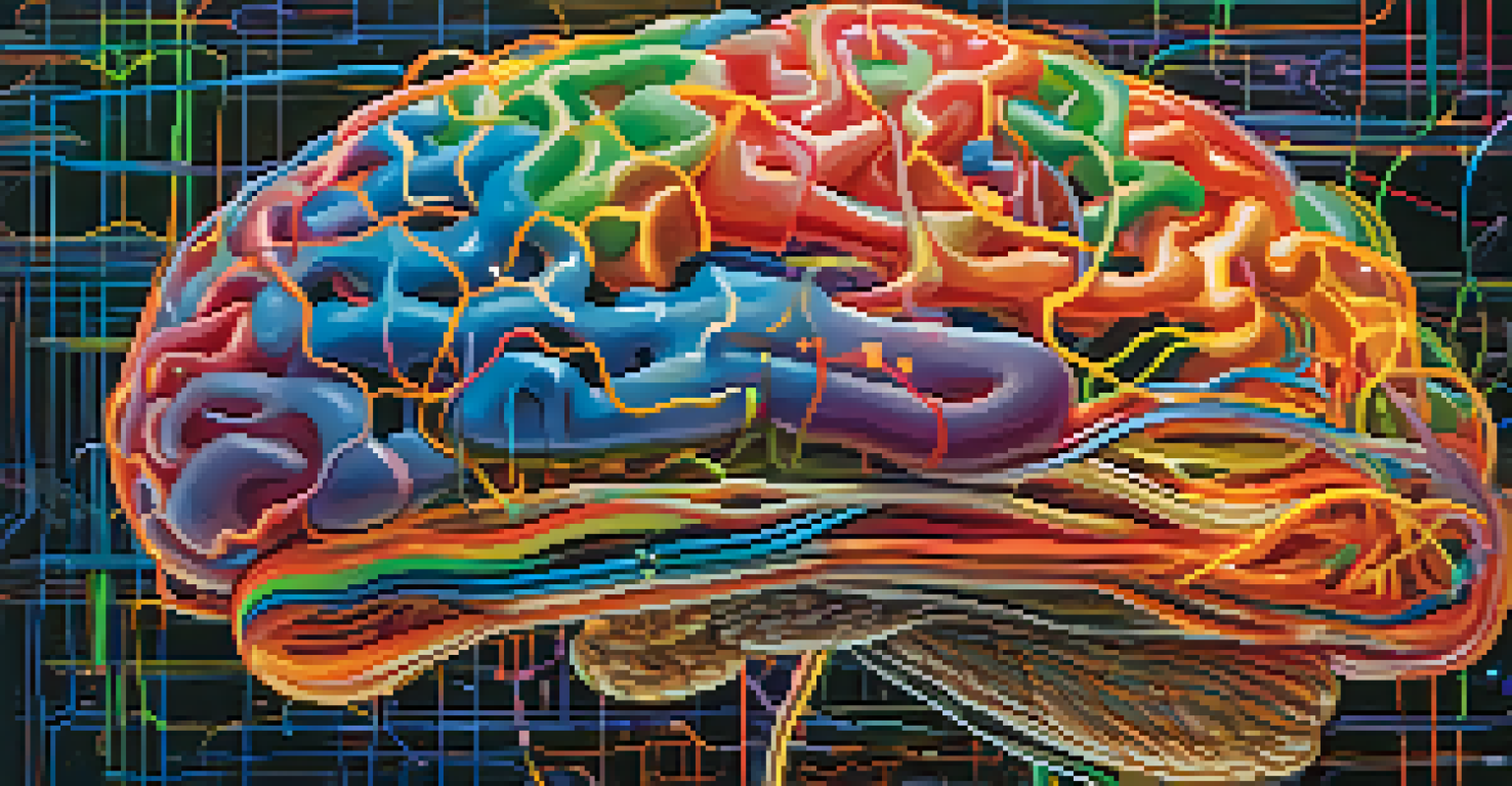Psychedelics, Peyote, and Their Neuroplastic Benefits

Understanding Psychedelics and Their Effects
Psychedelics are substances that alter perception, mood, and cognitive processes. Common psychedelics include LSD, psilocybin, and peyote, which is derived from the peyote cactus. These substances are known for their ability to induce profound changes in consciousness, often leading to enhanced creativity and spiritual experiences.
Psychedelics can help facilitate deep introspection and connection with nature, leading to profound realizations.
The effects of psychedelics can vary widely from person to person, depending on factors like dosage, the setting, and individual psychology. For some, these experiences can reveal deep insights and foster a sense of connectedness. This remarkable ability to shift perspective is what has drawn researchers’ attention in the realm of mental health and neuroplasticity.
Neuroplasticity, the brain's ability to reorganize itself by forming new neural connections, plays a crucial role in how psychedelics can affect mental health. By promoting neuroplasticity, psychedelics may help individuals break free from entrenched patterns of thought and behavior, which is particularly beneficial in treating conditions like depression and PTSD.
The Role of Peyote in Indigenous Cultures
Peyote has been used for thousands of years in various indigenous cultures across North America, primarily in spiritual and healing ceremonies. The active compound, mescaline, is responsible for its psychoactive effects, which have been revered for their ability to facilitate deep introspection and connection with nature. For these communities, peyote is not just a drug; it’s a sacred tool for healing and spiritual growth.

During peyote ceremonies, participants often report experiencing visions and profound insights, which can lead to a greater understanding of themselves and their place in the world. This traditional use highlights the importance of context and intention when it comes to psychedelics. Unlike recreational use, these rituals focus on healing and community, reinforcing the idea that setting can significantly influence psychedelic experiences.
Psychedelics Promote Neuroplasticity
Psychedelics like peyote can enhance the brain's ability to reorganize and form new neural connections, offering potential benefits for mental health treatment.
As interest in psychedelics grows in the modern world, there is a renewed appreciation for the wisdom of indigenous practices. Understanding the cultural significance of peyote can help frame contemporary discussions about its benefits, ensuring that these traditions are respected and integrated into modern therapeutic approaches.
Neuroplasticity: The Brain's Remarkable Ability
Neuroplasticity refers to the brain’s incredible ability to adapt and reorganize itself in response to new experiences or injuries. This process allows our brains to form new neural pathways, which is essential for learning and recovery. By enhancing neuroplasticity, psychedelics like peyote can potentially support therapeutic interventions for mental health disorders.
The future of psychedelics in therapy looks promising as more research supports their efficacy in treating various mental health conditions.
Research suggests that psychedelics can help 'reset' the brain's default mode network, which is often overactive in conditions like depression and anxiety. This reset can lead to a more flexible mindset, allowing individuals to break free from negative thought patterns. Essentially, psychedelics may provide a mental 'spring cleaning,' making space for new thoughts and behaviors.
The idea of using psychedelics to promote neuroplasticity is still being explored, but early studies show promising results. Many individuals have reported lasting changes in perspective and emotional well-being after psychedelic experiences, which may be attributed to the brain's newfound flexibility. This opens exciting possibilities for both therapy and personal growth.
Research on Psychedelics and Mental Health
In recent years, a resurgence of interest in psychedelics has sparked numerous studies exploring their therapeutic potential for mental health disorders. Research has shown that psychedelics can significantly alleviate symptoms of depression, anxiety, and PTSD, often with lasting effects after just a few sessions. This has led to a reevaluation of psychedelics in clinical settings, moving away from the stigma of the past.
Studies have indicated that psychedelics may help patients confront difficult emotions and traumatic experiences in a safe and controlled environment. By facilitating these emotional breakthroughs, individuals can process their trauma more effectively. The neuroplasticity induced by these substances may help reshape negative thought patterns, paving the way for healthier coping mechanisms.
Indigenous Use of Peyote
Peyote has a rich history in indigenous cultures for spiritual and healing ceremonies, emphasizing the importance of context and intention in psychedelic experiences.
While the research is still in its early stages, the results are encouraging. Organizations like MAPS (Multidisciplinary Association for Psychedelic Studies) are leading the charge in conducting rigorous clinical trials to further understand how psychedelics can be integrated into mental health treatment. As more data emerges, we may see a shift in how mental health care is approached, with psychedelics playing a central role.
How Peyote Works on the Brain
Peyote primarily contains mescaline, a compound that interacts with serotonin receptors in the brain. This interaction leads to alterations in perception, mood, and cognition. By stimulating these receptors, peyote can enhance sensory experiences and encourage introspective thought, leading to profound realizations during its use.
The effects of peyote can create a unique environment for neuroplasticity to thrive. Users often report heightened emotional awareness and a sense of connection to others, which can foster empathy and understanding. This emotional depth may be a catalyst for change, allowing individuals to confront and reframe their life experiences.
Additionally, peyote's effects can last for several hours, providing ample time for users to explore their thoughts and feelings. This extended experience can facilitate deeper insights and a more significant opportunity for neural reorganization, making peyote a potent ally in the journey of personal growth and healing.
Potential Risks and Considerations
While the potential benefits of psychedelics like peyote are exciting, it’s crucial to acknowledge the risks involved. Not everyone will have a positive experience, and some individuals may encounter challenging emotions or thoughts during their journey. This is why it’s essential to approach psychedelics with caution and ideally within a supportive setting.
Proper preparation and integration are vital to ensuring a safe and beneficial experience. Working with trained professionals can provide the guidance needed to navigate difficult moments and help individuals make sense of their experiences afterwards. It’s also essential to consider individual health conditions, as certain medical issues may increase the risk of adverse effects.
Growing Research on Mental Health
Recent studies indicate that psychedelics can effectively alleviate symptoms of mental health disorders, leading to a reevaluation of their therapeutic potential.
As the legal landscape around psychedelics evolves, more resources are becoming available to support safe use. Education on the risks and benefits, paired with access to trained facilitators, can aid in creating a responsible framework for exploring these powerful substances. Balancing enthusiasm for psychedelics with a realistic understanding of their potential challenges is essential.
The Future of Psychedelics in Therapy
The future of psychedelics in therapy looks promising as more research supports their efficacy in treating various mental health conditions. As scientific understanding grows, we may see a shift in public perception, moving from stigma to acceptance. This could lead to broader accessibility for those who could benefit from these powerful substances.
Potentially, we could witness the development of new therapeutic frameworks that incorporate psychedelics alongside traditional treatments. By combining the insights gained from psychedelic experiences with psychotherapy, individuals may find a more holistic approach to healing. This integrative model could change how we view mental health treatment entirely.

Furthermore, as more people share their positive experiences with psychedelics, advocacy for legal reform may increase. We could see psychedelic-assisted therapy becoming a standard practice in mental health care, allowing individuals to access the healing potential of substances like peyote in a safe and regulated environment. The journey ahead is filled with possibilities, and it’s an exciting time for the field.